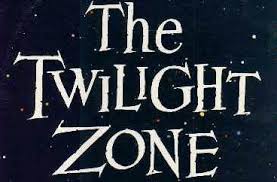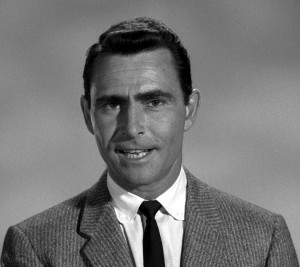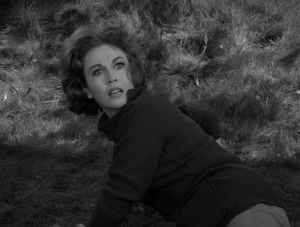Twilight Marathon
 Over the New Year weekend we couldn’t help catching some of the Twilight Zone marathon on the SyFy network. As a matter of fact, because my wife and I are both fighting illness, we ended up watching more episodes than we might have, joined frequently by my son and occasionally my daughter.
Over the New Year weekend we couldn’t help catching some of the Twilight Zone marathon on the SyFy network. As a matter of fact, because my wife and I are both fighting illness, we ended up watching more episodes than we might have, joined frequently by my son and occasionally my daughter.
None of us are strangers to the show; my wife and I in particular are fans from way back. Some we’ve seen multiple times. And yet there are others that were still new to us, and I bet if we had watched the whole thing we would have found a few more, especially those odd hour-long episodes from the 4th season.
Here, in no particular order, are some of the observations we made.
- Rod Serling seems like he must have been a pretty cool guy.
- The women sure run oddly — sort of sashaying helplessly as they swing their limp-wristed arms bent at the elbow. What’s up there? Were women taught to run like that back then? Why?
- The great episodes are just as strong as they always were, poignant, chilling, and, occasionally, heartwarming or life affirming.
 They really draw out an idea — the average or bad episodes pretty much talk an idea to death…
They really draw out an idea — the average or bad episodes pretty much talk an idea to death…- …yet somehow, even most of the weak ones pull you forward into the narrative to see how it will end. Even if you suspect in the first few minutes.
- We’ve yet to see one of the hour-long episodes (from the 4th season) that we’d number among the best.
- Everyone is both more forthright and more formal than you find people today — less standoffish, but more accustomed to referring to each other by “Mr.” or “Ms.” or other titles.
- Wow, was everyone a lot thinner then, even the crowds. Maybe that’s obvious, but it’s just really striking.
- Gender roles are so clearly demarcated in a different way than today, although women in the scripts are still depicted as intelligent and resourceful — and usually more insightful than some of the male characters.
- Characters sure spend an awful lot of time talking about their internal emotional state — probably a stage play thing. Coming off of reading a whole lot of hard boiled prose, all that talking sure feels different.
- Terror and suspense are evoked, quite effectively, by suggestion and shadow rather than blood and gore.
 Characters are so much more serious. Matters seem more weighty. There’s a sense of responsibility and command that reminds me of the sense of command you feel when you see the original Star Trek characters making a decision, that the people behind the scripts knew about life and death choices. But then Twilight Zone’s creator was a World War II vet, and actors and other writers were probably veterans too, just like Star Trek’s producer and many writers. (Compare the weight of responsibility of original Kirk versus new movie Kirk and you can see the difference in a generation of writers that grew up seeing the horror of WWII first hand and one that usually sees war from a distance and experiences combat via video game.)
Characters are so much more serious. Matters seem more weighty. There’s a sense of responsibility and command that reminds me of the sense of command you feel when you see the original Star Trek characters making a decision, that the people behind the scripts knew about life and death choices. But then Twilight Zone’s creator was a World War II vet, and actors and other writers were probably veterans too, just like Star Trek’s producer and many writers. (Compare the weight of responsibility of original Kirk versus new movie Kirk and you can see the difference in a generation of writers that grew up seeing the horror of WWII first hand and one that usually sees war from a distance and experiences combat via video game.)- Speaking of Star Trek, the orchestration of the tension music in The Twilight Zone episodes clearly presages/influenced it. Sometimes I swear I’m hearing very similar transitions and chord sequences, played on about the same number of woodwinds and strings. I haven’t noticed that in other shows of the era.
- I don’t know if it could be brought back. It’s been tried, twice, but I think it lacked that key ingredient named Rod Serling. And it may be too much of its time.
- There are still some we haven’t seen. We may not run out to watch them this minute, but we’ll probably tune in next year to see if there are any other undiscovered gems.
3 Comments